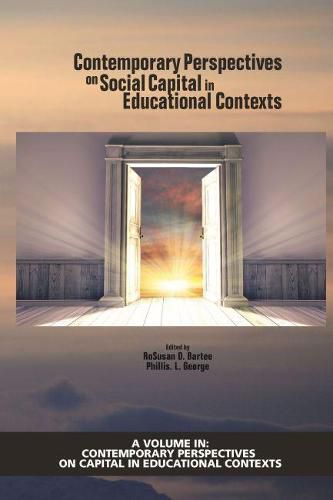Readings Newsletter
Become a Readings Member to make your shopping experience even easier.
Sign in or sign up for free!
You’re not far away from qualifying for FREE standard shipping within Australia
You’ve qualified for FREE standard shipping within Australia
The cart is loading…






This title is printed to order. This book may have been self-published. If so, we cannot guarantee the quality of the content. In the main most books will have gone through the editing process however some may not. We therefore suggest that you be aware of this before ordering this book. If in doubt check either the author or publisher’s details as we are unable to accept any returns unless they are faulty. Please contact us if you have any questions.
The currency of social capital serves as an important function given the capacity to generate external access (getting to) and internal accountability (getting through) for individuals and institutions alike. Pierre Bourdieu (1986) defines social capital as the aggregate of the actual or potential resources which are linked to possession of a durable network of more or less institutionalized relationships of mutual acquaintance and recognition or in other words, to membership in a group (p. 251). Social capital contains embedded resources as a tool for manifesting opportunities and options among individuals and groups. Inevitably, the aforementioned opportunities and options become reflective of the depth and breadth of access and accountability experienced by the individual and institution. As educational stakeholders, we must consistently challenge ourselves with the question, How do K-12 schools and colleges and universities accomplish shared, egalitarian goals of achieving access and accountability? Such goals become fundamental toward ensuring students matriculating through K-12 and higher education, irrespective of background, are provided the caliber of education and schooling experience to prepare them for economic mobility and social stability.
To that end, the volume, Contemporary Perspectives on Social Capital in Educational Contexts (2019), as part of the book series, Contemporary Perspectives on Capital in Educational Contexts, offers a unique opportunity to explore social capital as a currency conduit for creating external access and internal accountability for K-12 and higher education. The commonalities of social capital emerging within the 12 chapters of the volume include the following: 1) Social Capital as Human Connectedness; 2) Social Capital as Strategic Advocacy; 3) Social Capital as Intentional Engagement; and 4) Social Capital as Culturally-Responsive Leadership. Thus, it becomes important for institutions of education (i.e. secondary, postsecondary, continuing) and individuals to assume efforts with intentionality and deliberateness to promote access and accountability.
$9.00 standard shipping within Australia
FREE standard shipping within Australia for orders over $100.00
Express & International shipping calculated at checkout
This title is printed to order. This book may have been self-published. If so, we cannot guarantee the quality of the content. In the main most books will have gone through the editing process however some may not. We therefore suggest that you be aware of this before ordering this book. If in doubt check either the author or publisher’s details as we are unable to accept any returns unless they are faulty. Please contact us if you have any questions.
The currency of social capital serves as an important function given the capacity to generate external access (getting to) and internal accountability (getting through) for individuals and institutions alike. Pierre Bourdieu (1986) defines social capital as the aggregate of the actual or potential resources which are linked to possession of a durable network of more or less institutionalized relationships of mutual acquaintance and recognition or in other words, to membership in a group (p. 251). Social capital contains embedded resources as a tool for manifesting opportunities and options among individuals and groups. Inevitably, the aforementioned opportunities and options become reflective of the depth and breadth of access and accountability experienced by the individual and institution. As educational stakeholders, we must consistently challenge ourselves with the question, How do K-12 schools and colleges and universities accomplish shared, egalitarian goals of achieving access and accountability? Such goals become fundamental toward ensuring students matriculating through K-12 and higher education, irrespective of background, are provided the caliber of education and schooling experience to prepare them for economic mobility and social stability.
To that end, the volume, Contemporary Perspectives on Social Capital in Educational Contexts (2019), as part of the book series, Contemporary Perspectives on Capital in Educational Contexts, offers a unique opportunity to explore social capital as a currency conduit for creating external access and internal accountability for K-12 and higher education. The commonalities of social capital emerging within the 12 chapters of the volume include the following: 1) Social Capital as Human Connectedness; 2) Social Capital as Strategic Advocacy; 3) Social Capital as Intentional Engagement; and 4) Social Capital as Culturally-Responsive Leadership. Thus, it becomes important for institutions of education (i.e. secondary, postsecondary, continuing) and individuals to assume efforts with intentionality and deliberateness to promote access and accountability.